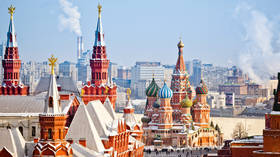SAS cuts raise concerns over UK’s military strength
British Special Forces are undergoing the biggest cuts since the Second World War. The Ministry of Defence will be downsizing their elite SAS unit after having its budget slashed.
While the decision may save the government a few pennies, many say the cost of axing members of a global asset spells disaster for the country's future.
World-renowned and notoriously camera-shy, the cream of Britain’s Special Forces is currently at work in Afghanistan. They are seen as one of the greatest assets the UK’s army has to offer, but even they are not immune to government cuts.
The Ministry of Defence is being forced to save between 10% and 20% of its budget. For the SAS, that will mean getting rid of those too old for combat duty, and axing one of its part time battalions.
Bob Paxman used to be in the SAS, and now helps servicemen to overcome post traumatic stress disorder. He wonders what will happen to the men who have spent their lives in extreme situations.
“My concern would be the vast amount of guys that are now going to be out of work, that have been in a military environment, particularly combat environment, hostile environments for a number of years, they all of sudden are going to find themselves with a skills set that they can’t use in a civil community, pretty hacked off for the fact that they are now out of a job, so it is going to be interesting to see what the impact on the social environment in the UK is going to be,” Bob Paxman wonders.
Some say the decision to axe old soldiers is a false economy. They are the ones with the know-how and invaluable experience. Yet as the UK’s economy shrinks, difficult decisions have to be made.
Economists are urging for a proper look at what the UK’s defense needs actually are, rather than just lopping off a bit here and there.
Director General of the Institute of Economic Affairs Mark Littlewood told RT “I think there’s a real problem with approach here, and it does seem that, across the board, the government’s trying to find 10% savings here, 20% there, and I don’t think that sort of salami slicing approach is really going to work.”
“I think what you really need to ask is what are Britain’s military needs going to be over the next 10, 20, 30 years, as far as we can predict them, and then design your armed forces to actually accommodate those strategic concerns, rather than just trying to save on paperclips and stationery,” he concluded.
UK Special Forces have been active in all the major conflicts in recent years: Iraq, Kosovo, East Timor, and now Afghanistan, where 9,500 British troops are currently deployed. The question is whether the British army will be able to play peacekeeping or military roles in foreign conflicts in the future.
At the same time, rising economic powers are also increasing their military forces.
Malcolm Chalmers, who is a Professorial Fellow in British Security Policy at the Royal United Services Institute for Defence and Security Studies (RUSI) points out that “The military capability of countries like China and India is going to continue to rise, because their economy is rising, so that is going to create some nervousness from a period in which NATO countries, and the US most of all, but also most European countries certain enjoyed technological superiority against other states where we are going to move in a more multi-polar world, perhaps Europeans will feel rather uncomfortable about that.”
Not just discomfort, defense cuts ultimately mean European countries will be increasingly dependent on multilateral alliances to ensure their national security.
A defense review is currently underway, with results due to be published in late autumn. What insiders hope for is a wide-reaching decision on the UK’s defense priorities. What some are afraid they are going to get is paper-shuffling and useless cutbacks in Britain’s already over-stretched armed forces.












